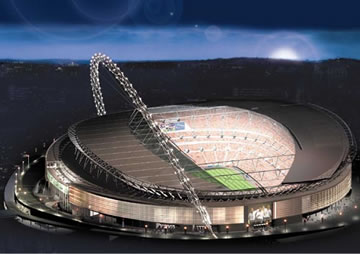
As reported in The Guardian, the new Wembley stadium might not be ready in time for it's planned opening date of 13th May - the FA Cup final. The FA have already made alternative plans to hold the final at the Millenium Stadium in Cardiff, and presumably the League will follow suite for the divisional playoffs.
Meanwhile, the BBC's trio of grand projets also seem to have fallen by the wayside, with the redevelopment of the flagship Broadcasting House severly set back. This follows the removal of the architects MacCormac Jamieson Prichard, after a heavy dose of 'value engineering', as doublespeak a euphemism for cost-cutting as you are likely to hear. Meanwhile the BBC Scotland headquarters by Chipperfield has suffered a similar fate, while the White City Music Box home for the BBC Orchestras by Foreign Office Architects is still stuck firmly to the drawing board.
There's an air of inevitability that big complex projects will come up short, lost the Bermuda triangle that exists between Cost, Quality and Time (famously, you can only ever hope to acheive two out of three).
In the book Megaprojects and Risk: An Anatomy of Ambition (excerpt here), authors Bent Flyvbjerg, Nils Bruzelius, Werner Rothengatter trace the evolution of the megaproject:
"Megaprojects form part of a remarkably coherent story. Sociologist Zygmunt Bauman perceptively calls it the 'Great War of Independence from Space', and he sees the resulting new mobility as the most powerful and most coveted stratifying factor in contemporary society. Paul Virilio speaks of the end of geography while others talk of the 'death of distance'. Bill Gates, founder and chairperson of Microsoft Corporation, has dubbed the phenomenon 'frictionless capitalism' and sees it as a novel stage in capitalist evolution."
and their all-to-often disappointing outcome:
"There is a paradox here, however. At the same time as many more and much larger infrastructure projects are being proposed and built around the world, it is becoming clear that many such projects have strikingly poor performance records in terms of economy, environment and public support."
In the end, perhaps, it is better to be late than to take shortcuts on quality; after all, who remembers that the Millennium Wheel/London Eye wasn't ready in time for New Years Eve 2000, nor was the Millennium Bridge.
More to follow.
[first posted Dec 21, 2005]
